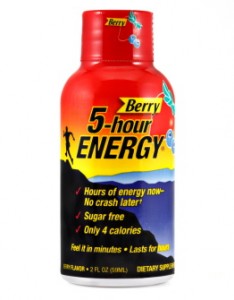The Center for Science in the Public Interest is warning consumers not to believe a new web ad for 5-hour Energy. The controversial drink is being investigated for its alleged role in 13 deaths. There have been reports from 92 people who became ill after using the product. The product is sold as a “nutritional supplement”, so limits on caffeine that apply to soft drinks and other beverages do not apply to these beverages.
 Last year, trend data released by the Drug Abuse Warning Network showed a sharp increase in the number of emergency room visits involving energy drinks. In 2005, there were 1,128 visits, and in 2009 there were 13,114 visits, representing a tenfold increase. About half of the visits were made by 18 to 25-year-old patients who combined the drinks with alcohol or other drugs. In October, Monster Beverages was sued by the family of a 14-year-old girl who died after developing a heart arrhythmia after drinking the beverage.
Last year, trend data released by the Drug Abuse Warning Network showed a sharp increase in the number of emergency room visits involving energy drinks. In 2005, there were 1,128 visits, and in 2009 there were 13,114 visits, representing a tenfold increase. About half of the visits were made by 18 to 25-year-old patients who combined the drinks with alcohol or other drugs. In October, Monster Beverages was sued by the family of a 14-year-old girl who died after developing a heart arrhythmia after drinking the beverage.
The total amount of caffeine in these drinks can vary from 80 to more than 500 milligrams in a single can. There are 50 milligrams of caffeine in a 12-ounce cola and 100 milligrams in a 5-ounce cup of coffee. Doctors say 200 to 300 milligrams of caffeine per day is safe for most people. Ingesting more than 500 milligrams per day can cause fast heartbeat, muscle tremors, stomach upset, and irritability.
The ad shows CSPI Executive Director Michael F. Jacobson saying that the product is safe because it takes a lot of caffeine to cause death. CSPI says this is misleading, because while it’s true it takes a lot of caffeine to kill most people, the amount of caffeine in 5-hour Energy drinks can cause other problems such as insomnia, anxiety, and reduced fertility. Furthermore, 5-hour Energy also contains chemicals such as citicoline, sucralose, potassium sorbate, sodium benzoate, malic acid, and glucuoronolactone. CSPI says that interactions between these ingredients could be responsible for the illnesses or deaths. The product has also been associated with heart attacks, convulsions, and one spontaneous abortion.
CSPI has sent a cease and desist letter to Farmington Hills, the maker of 5-hour Energy, telling them to stop using Jacobson’s and CSPI’s names in their ads. Jacobson said in a statement, “I advise consumers not to use 5-hour Energy – at least until the FDA gets to the bottom of the heart attacks, convulsions, and deaths that have been reported in connection with the product.”
Last month, Senator Edward Markey (D-MA) sent a letter to the Federal Trade Commission, asking them to investigate advertising claims made by energy drink makers that could be in violation of the FTC Act as “unfair or deceptive.” He wrote, “The advertising claims made by energy drink manufacturers are particularly alarming in light of the increase in advertisements targeted primarily to children and teenagers. Until we know more about the health impacts of these so-called energy drinks, it is inappropriate and may very well be dangerous to advertise them to children and teens.”




